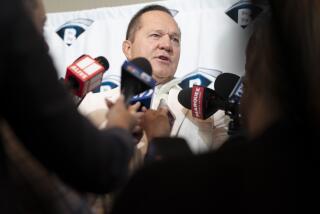President Strikes Out at White House : Labor: Clinton ‘exasperated’ that he can’t get a settlement in baseball strike. Mediator gets nowhere.
WASHINGTON — An “exasperated” President Clinton failed to get the baseball settlement he wanted Tuesday after players and owners defied his deadline to end the strike.
Clinton immediately ordered negotiators to the White House, and there was speculation by union lawyers that he might try to pressure both sides into accepting binding arbitration.
Vice President Gore, Labor Secretary Robert Reich and mediator W.J. Usery met with players and owners in the Roosevelt Room for more than an hour before Clinton joined the talks.
The president stayed with them for another hour before going to a reception for new members of Congress, leaving the two sides to discuss what a spokeswoman said was a White House suggestion on how to proceed.
“The discussions have been about process, not substance,” deputy press secretary Ginny Terazano said.
Earlier in the day, Usery, the president’s hand-picked mediator, gave the owners and players his suggestions for settling the six-month dispute, but got nowhere.
Clinton, Gore and several White House aides then met with Usery for 35 minutes in the Oval Office to hear an outline of his plan. Details of that plan were not disclosed to reporters.
“The president was exasperated that there was no progress toward settling the baseball strike,” White House spokesman Mike McCurry said.
Neither side was willing to discuss what was in Usery’s outline, but clearly it contained no major breakthrough.
“It’s not something we are going to accept,” one player agent said, speaking on the condition he not be identified.
But management spokesman Rich Levin did say, “We have not rejected them.”
Earlier Tuesday, the Republican leadership of Congress discouraged turning to Capitol Hill for a solution to the strike. Clinton has no legal power to end the strike, and would need Republican support to force either the terms of a settlement or binding arbitration.
With spring training due to start a week from Thursday, the strike appeared no closer to conclusion than when it began Aug. 12.
“We’ll just have to see what they offer,” Detroit’s Cecil Fielder said.
Representing the players at the White House meeting were Fielder, Atlanta’s Tom Glavine, Pittsburgh’s Jay Bell, Kansas City’s David Cone, free agent Scott Sanderson, union head Donald Fehr and associate general counsel Eugene Orza.
Representing owners were Milwaukee’s Bud Selig--the acting commissioner since owners forced out Fay Vincent in September 1992--Boston’s John Harrington, Colorado’s Jerry McMorris and former St. Louis chief executive officer Stuart Meyer. They were accompanied by lawyers Chuck O’Connor and Rob Manfred from the law firm Morgan Lewis & Bockius.
Asked before the meeting if he was optimistic, Selig said: “We’ll let you know when we get back.”
As owners were heading toward the White House, the National Labor Relations Board issued a new threat against them. On Friday, after the NLRB threatened to seek an injunction against them, owners rescinded the salary cap they imposed on Dec. 22
But two days later, management’s Player Relations Committee--the owners’ labor wing--refused to restore the status quo, revoking the right of individual teams to sign players.
“I made clear that the PRC would act at its peril in making any changes of employment other than restoration of the pre-Dec. 22 status quo,” NLRB general counsel Fred Feinstein said.
On Capitol Hill, House Speaker Newt Gingrich and Senate Majority Leader Bob Dole said Congress should stay out of the mess.
“I think that between balanced budget, welfare reform, Medicaid reform, trying to get a budget passed, etc., that I’m not sure Congress is the right place to try to organize the national pastime,” Gingrich said during a news conference. “So I’d be very, very cautious.”
Dole, urging both sides to accept Usery’s plan, expressed a similar sentiment on the Senate floor.
“Let me be crystal clear on one important point,” he said, “neither party--player nor owner--should be looking to Congress for any magic solutions. The magic solution can only be found at the bargaining table.”
The White House wasn’t pleased that Republicans failed to back up the president’s push for a deal.
“Why would anyone who loves baseball want to take a tool off the table that might be useful in helping convince the players and owners to try harder to settle their strike?,” McCurry said early in the day. “That doesn’t make a lot of sense.”
The strike, baseball’s eighth since 1972, has frustrated millions. In San Francisco, former President Carter called it “disgusting” and offered yet again to mediate.
Players, trying to preserve decades of gains that have pushed their average salary to nearly $1.2 million, walked out to fight off the salary cap. The strike canceled the final 52 days and 669 games of last season and wiped out the World Series for the first time since 1904.
More to Read
Go beyond the scoreboard
Get the latest on L.A.'s teams in the daily Sports Report newsletter.
You may occasionally receive promotional content from the Los Angeles Times.









